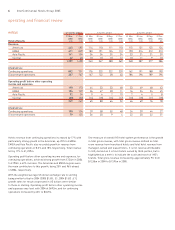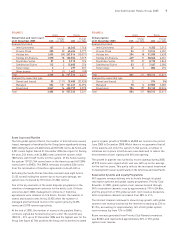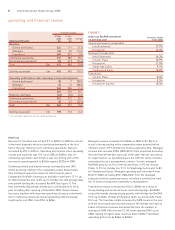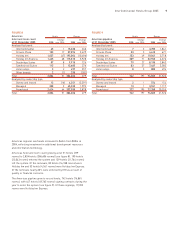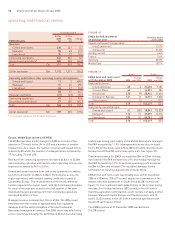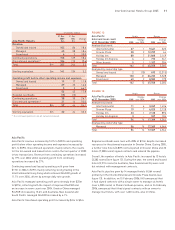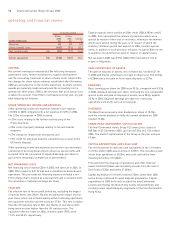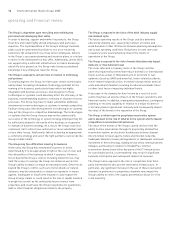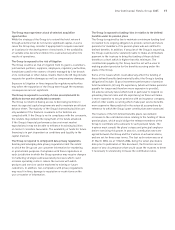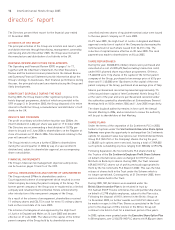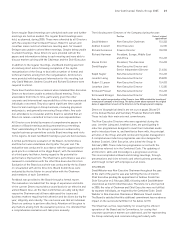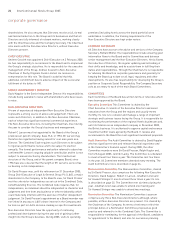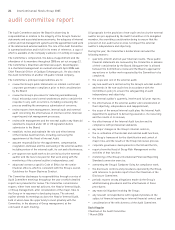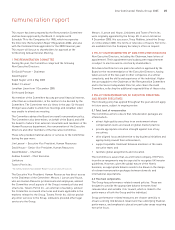Holiday Inn 2005 Annual Report Download - page 18
Download and view the complete annual report
Please find page 18 of the 2005 Holiday Inn annual report below. You can navigate through the pages in the report by either clicking on the pages listed below, or by using the keyword search tool below to find specific information within the annual report.
The Group is dependent upon recruiting and retaining key
personnel and developing their skills
In order to develop, support and market its products, the Group
must hire and retain highly skilled employees with particular
expertise. The implementation of the Group’s strategic business
plans could be undermined by failure to recruit or retain key
personnel, the unexpected loss of key senior employees, failures
in the Group’s succession planning and incentive plans, or a failure
to invest in the development of key skills. Additionally, unless skills
are supported by a sufficient infrastructure to enable knowledge
and skills to be passed on, the Group risks losing accumulated
knowledge if key employees leave the Group.
The Group is exposed to certain risks in relation to technology
and systems
To varying degrees, the Group is reliant upon certain technologies
and systems (including Information Technology systems) for the
running of its business, particularly those which are highly
integrated with business processes, and disruption to those
technologies or systems could adversely affect the efficiency of the
business, notwithstanding business continuity or disaster recovery
processes. The Group may have to make substantial additional
investments in new technologies or systems to remain competitive.
Failing to keep pace with developments in technologies or systems
may put the Group at a competitive disadvantage. The technologies
or systems that the Group chooses may not be commercially
successful or the technology or system strategy employed may not
be sufficiently aligned to the needs of the business or responsive
to changes in business strategy. As a result, the Group could lose
customers, fail to attract new customers or incur substantial costs
or face other losses. Additionally, failure to develop an appropriate
e-commerce strategy and select the right partners could erode the
Group’s market share.
The Group may face difficulties insuring its business
Historically, the Group has maintained insurance at levels
determined by it to be appropriate in light of the cost of cover and
the risk profiles of the business in which it operates. However,
forces beyond the Group’s control, including market forces, may
limit the scope of coverage the Group can obtain as well as the
Group’s ability to obtain coverage at reasonable rates. Other forces
beyond the Group’s control, such as terrorist attacks or natural
disasters, may be uninsurable or simply too expensive to insure
against. Inadequate or insufficient insurance could expose the
Group to large claims or could result in the loss of capital invested
in properties as well as the anticipated future revenue from
properties, and could leave the Group responsible for guarantees,
debt or other financial obligations related to the property.
The Group is exposed to the risks of the hotel industry supply
and demand cycle
The future operating results of the Group could be adversely
affected by industry over-capacity (by number of rooms) and
weak demand or other differences between planning assumptions
and actual operating conditions. Reductions in room rates and
occupancy levels would adversely impact the results of
operations of the Group.
The Group is exposed to the risk of events that adversely impact
domestic or international travel
The room rates and occupancy levels of the Group could be
adversely impacted by events that reduce domestic or international
travel, such as actual or threatened acts of terrorism or war,
epidemics (such as SARS and avian flu), travel-related accidents,
travel-related industrial action, increased transportation and fuel
costs and natural disasters resulting in reduced worldwide travel
or other local factors impacting individual hotels.
A decrease in the demand for hotel rooms as a result of such
events may have an adverse impact on the Group’s operations and
financial results. In addition, inadequate preparedness, contingency
planning or recovery capability in relation to a major incident or
crisis may prevent operational continuity and consequently impact
the value of the brand or the reputation of the Group.
The Group is reliant upon its proprietary reservation system
and is exposed to the risk of failures in the system and increased
competition in reservation infrastructure
The value of the brands of the Group is partly derived from the
ability to drive reservations through its proprietary HolidexPlus
reservation system, an electronic booking and delivery channel
directly linked to travel agents, hotels and internet networks.
Inadequate disaster recovery arrangements, or inadequate continued
investment in this technology, leading to loss of key communications
linkages, particularly in relation to HolidexPlus, internet
reservation channels and other key parts of the IT infrastructure
for a prolonged period, or permanently, may result in significant
business interruption and subsequent impact on revenues.
The Group is also exposed to the risk of competition from third-
party intermediaries who provide reservation infrastructure. In
particular, any significant increase in the use of these reservation
channels in preference to proprietary channels may impact the
Group’s ability to control the supply, presentation and price of its
room inventory.
operating and financial review
16 InterContinental Hotels Group 2005


